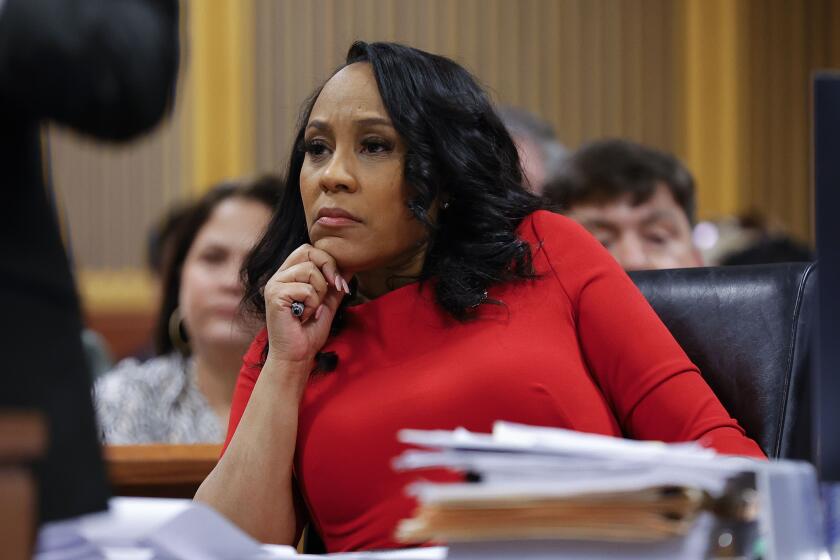The Public Interest Demands Full Disclosure
The insurance business is a multibillion-dollar industry in California. Due to the enormous impact the industry has on our lives, the state Department of Insurance was separated from Business, Transportation and Housing Agency, creating an independent department. Clearly the department’s mission was consumer protection through its investigation of claims, response to inquiries and enforcement actions.
Inevitably, a consequence of creating regulatory bodies is that those who are regulated attempt to influence and subvert the process. But the insurance company conduct after the Northridge earthquake underscores the need for regulation of the industry. The challenge is to create an effective regulatory scheme with checks and balances to protect consumers and the integrity of the system.
One essential check is the need for documents and records to be free and open to the public. It is astounding that documents, agreements and insurance company exams performed by Department of Insurance employees are being withheld from public view.
Several years ago, the state Department of Insurance’s professional auditors conducted a thorough audit of State Farm, Allstate, 20th Century (now 21st Century) and other insurance companies for their treatment of policyholders who submitted claims after the Northridge earthquake in 1994.
According to The Times, the investigators found that State Farm broke state policyholder protection laws in nearly half of the claims files reviewed--an astounding indictment of that company’s practices. The company denied, delayed or low-balled legitimate claims; misled policyholders about what was covered under the policy, and forced many policyholders to go to court to get State Farm to pay legitimate claims. The agency staff recommended that State Farm be ordered to make restitution to its policyholders and pay an unprecedented $2.4 billion fine.
Similar violations and lesser penalties were proposed for the other insurers. But Insurance Commissioner Chuck Quackenbush chose to ignore his staff’s investigation and recommendations, and instead ordered the insurers to pay at least $12 million to nonprofit foundations that would be set up by Quackenbush.
Quackenbush has so far refused requests by the Legislature and consumer groups to turn over copies of the agency audits and recommendations.
To compound this distressing, if not illegal, situation, documents recently surfaced that expose agreements between Quackenbush and insurance companies that essentially eliminate industry liability and responsibility for mismanagement of Northridge claims. One such agreement between Quackenbush and Farmers Insurance Co. absolves Farmers from any wrongdoing or Department of Insurance regulation regarding Northridge earthquake claims.
Even more outrageous is that Farmers will conduct its own claims survey--in place of an independent survey by the commissioner--regarding the handling of Northridge earthquake claims. Even worse, if policyholders respond to the survey, they relinquish their right to sue. Not surprisingly, this agreement was written by Farmers’ lawyers and signed by the commissioner.
All these audits and agreements languish in secrecy. Some documents found their way through the underground to hands willing to make them public. Even access to these damaging documents is severely limited. The public deserves to see how their insurance carriers handle claims and how the commissioner regulates illegal activities. Quackenbush apparently fears the light that will be shed on his department’s lax oversight, while insurance companies fear exposure of their bad faith misconduct.
Just last month, insurance companies spent $60 million in a successful effort to repeal Senate Bill 1237 through the defeat of Propositions 30 and 31--a carefully crafted compromise package that would have given injured consumers the right to sue the insurance company of an at-fault motorist if the company refused to pay the victim’s medical bills and other expenses promptly and fully.
While many insurers apparently had enough confidence in their own practices to live with the new rules, others did not. The largest companies doing business in California--State Farm, Farmers and Allstate--funded most of the campaign against Propositions 30 and 31. It seems hardly a coincidence that these are the same companies that state investigators recommended pay over $3 billion in fines for mishandling Northridge claims.
If voters knew in March what they know now about rampant mishandling of claims by insurance carriers, the fate of Propositions 30 and 31 may have been different.
Restoring confidence and fairness to California’s insurance business will not be easy, but to give up would be worse. The first step entails action to seek public access to what should be public documents. We need access to information being withheld by Quackenbush and in secret settlement agreements. The public interest demands full disclosure.
More to Read
Get the L.A. Times Politics newsletter
Deeply reported insights into legislation, politics and policy from Sacramento, Washington and beyond. In your inbox three times per week.
You may occasionally receive promotional content from the Los Angeles Times.






